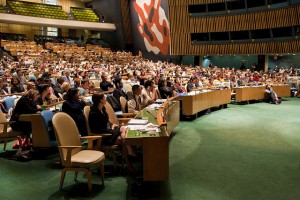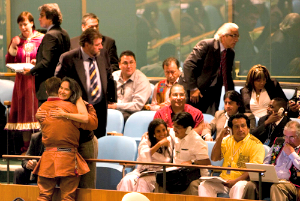High-level 10th Anniversary Commemoration

On Tuesday 25 April 2017, the President of the 71st session of the General Assembly organized a high-level event to mark the tenth anniversary of the adoption of the United Nations Declaration on the Rights of Indigenous Peoples.
Objectives The event took place in follow up to the General Assembly decision to convene a high-level event to mark the tenth anniversary of the adoption of the United Nations Declaration on the Rights of Indigenous Peoples, to be held during the seventy-first session of the General Assembly, in 2017 (Resolutions A/RES/69/159, A/RES/70/232 and A/RES/71/178).
This high level event took stock of achievements made since the adoption of the United Nations Declaration on the Rights of Indigenous People, to identify ongoing persistent challenges and obstacles and to consider good practices. It provided an opportunity to review the commitments made by Member States in the outcome document of the 2014 World Conference on Indigenous Peoples. Participants had an opportunity to make concrete commitments to further increase their efforts to implement the provisions of the United Nations Declaration on the Rights of Indigenous Peoples.
Format The high-level event was convened by the President of the General Assembly on 25 April, 2017 at the General Assembly Hall, during the annual session of the Permanent Forum on Indigenous Issues. This is in order to take advantage of the presence of high level dignitaries from Member States and high number of indigenous peoples’ representatives from across the globe. In order to facilitate the participation of indigenous peoples, the Forum temporarily suspended its morning session.
The high-level event consisted of an opening segment and a high-level plenary meeting. In the opening segment the President of the General Assembly, the Secretary-General and Key Note Speakers delivered remarks. The three UN mechanisms on the rights of indigenous peoples’ were also invited to speak. During the high level plenary meeting the list of speakers rotated between Member States and indigenous peoples’ representatives.
Conference Room 4 was used as the overflow room for the morning session of the High-level event.
Webcast Part 1: EN| RU| ES| FR| AR| ZH| Part 2: EN| RU| ES| FR| AR| ZH|
Programme:
Opening segment Statement by H.E. Peter Thomson, President of the General Assembly delivered by the Vice-president, Durgan Prasad Bhattarai, Permanent Representative of the Federal Democratic of Nepal
Keynote address by H.E. Mr. Evo Morales Ayma, President of the Plurinational State of Bolivia
Remarks by Ms. Kyung-wha Kang, Senior Policy Advisor to the Secretary-General of the United Nations
Remarks by Mr. Andrew Gilmour, Assistant-Secretary-General of the New York Office of Human Rights
Remarks by Ms. Mariam Wallet Aboubakrine, Chairperson of the Permanent Forum on Indigenous Issues
Remarks by Ms. Victoria Tauli-Corpuz, Special Rapporteur on the Rights of Indigenous Peoples
Remarks by Mr. Alberth Barume, Chairperson of the Expert Mechanism on the Rights of Indigenous Peoples
Plenary Segment Statements by Member States: Canada, Guatemala, Venezuela, Chile, Colombia, South Africa, Ukraine, Sweden, Mexico, Finland, Russian Federation, European Union, Nicaragua, Australia, El Salvador, Ecuador, Peru, Estonia, New Zealand, Cuba, the Philippines, Brazil, Hungary, the United States of America, Denmark, Honduras, Argentina, China, Nepal and Japan.
Statements by Indigenous Peoples Representatives (one from each) of the seven socio-cultural regions (Interspersed with Member States speakers):
Ms. Agnes Leina, African region
Ms. Joan Carling, Asian region
Mr. Luis Macas, Central and South America and the Caribbean region
Ms. Okalik Eegeesiak, Arctic region Representative of the Central and Eastern Europe, the Russian Federation, Central Asia and Transcaucasia
Mr. Oren Lyons, North American region
Mr. Ghazali Ohorella, Pacific region
Statement by ILO
Relevant information:
Background According to General Assembly Resolution (A/RES/70/232) adopted on 23 December 2015, the General Assembly:
"4. Reaffirms the decision to convene a high-level event to mark the tenth anniversary of the adoption of the United Nations Declaration on the Rights of Indigenous Peoples, to be held during the seventy-first session of the General Assembly, in 2017, and that the event will take stock of the achievements of the preceding 10 years and assess the remaining challenges for the rights of indigenous peoples, and also consider the further follow-up to the Declaration, including the consideration of a third International Decade;"
And according to General Assembly resolution (A/RES/69/159) on the Rights of Indigenous Peoples, of 18 December 2014, the General Assembly:
"5. Decides to convene a high-level event to mark the tenth anniversary of the adoption of the United Nations Declaration on the Rights of Indigenous Peoples, to be held during the seventy-first session of the General Assembly, in 2017, and that the event will take stock of the achievements of the preceding 10 years and assess the remaining challenges for the rights of indigenous peoples, and also consider the further follow-up to the Declaration, including the consideration of a third International Decade;" [/accordion-item][accordion clicktoclose="true"][accordion-item title="Fifth Anniversary (2012)"] According to General Assembly Resolution (A/RES/66/142) adopted on 19 December 2011, the General Assembly: "6. Request(ed) the Secretary-General, in coordination with the United Nations Permanent Forum on Indigenous Issues, to convene, within existing resources, a high-level event during the eleventh session of the Forum to commemorate the fifth anniversary of the adoption of the United Nations Declaration on the Rights of Indigenous Peoples in order to raise awareness of the importance of pursuing its objectives;" Following the provisions of the resolution, a High-level Commemoration of the Fifth Anniversary of the Adoption of the UN Declaration on the Rights of Indigenous Peoples was held on 17 May 2012. Programme
Webcast
Statements and messages
Press Conference

 Welcome to the United Nations
Welcome to the United Nations
